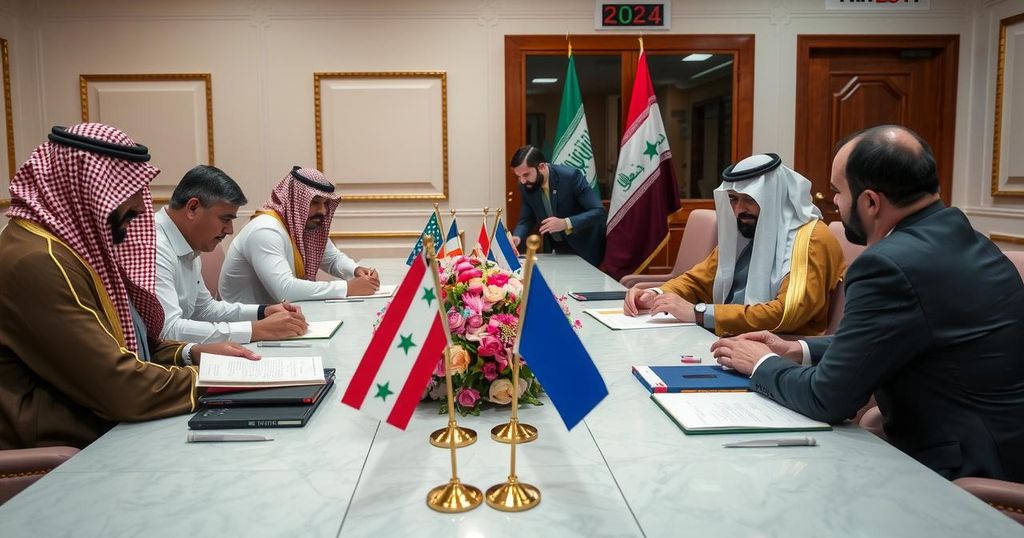Saudi Arabia has called for lifting sanctions on Syria, emphasizing their hindrance to development following discussions with diplomats from West Asia and Europe. The meetings addressed the future of Syria under new leadership after the ousting of Bashar al-Assad. While Saudi Arabia seeks to bolster its influence, Western powers remain cautious and emphasize the need for inclusive governance by Syria’s new rulers before any sanctions are lifted.
On January 13, 2025, Saudi Arabia urged for the lifting of sanctions imposed on Syria during discussions with diplomats from West Asia and Europe, focusing on the future of the war-torn nation. As the region’s largest economy, Saudi Arabia aims to enhance its influence in Syria following the recent change in leadership, where Islamist-led rebels deposed Bashar al-Assad. Saudi Foreign Minister Prince Faisal bin Farhan emphasized that ongoing sanctions obstruct the developmental prospects of the Syrian populace.
The discussions included Arab officials and representatives from Turkiye, France, the European Union, and the United Nations, highlighting a collaborative regional approach towards addressing Syria’s challenges. New Syrian leader Mohamed al-Jolani, whose faction played a pivotal role in ousting Assad, is advocating for improved relations and sanctions relief. Western powers, having imposed stringent sanctions on Assad’s regime since 2011, are cautious about easing restrictions and are assessing the new government’s commitment to fostering a more inclusive political environment.
The potential for lifting restrictions was echoed by EU’s top diplomat, Kaja Kallas, who signaled that relief could be forthcoming, contingent upon the Syrian leadership’s genuine efforts to incorporate minority representation within governance. Germany’s Foreign Minister, Annalena Baerbock, echoed the necessity of providing humanitarian aid while maintaining sanctions against individuals accountable for wartime atrocities. Saudi Arabia’s renewed support could play a significant role in reconstructing Syria while navigating the complexities of international diplomacy and sanctions management.
Saudi Arabia’s engagement in Syria reflects a broader geopolitical strategy aimed at revitalizing its influence in the Middle East following years of conflict that have devastated the country. The nation severed ties with Bashar al-Assad’s government in 2012, advocating for his ouster alongside other Gulf states. However, recent developments have prompted a recalibration of its stance, particularly in light of a new leadership under Mohamed al-Jolani. The prolonged civil war has resulted in immense human suffering, with millions displaced and infrastructure in ruins, leading to increased calls for international intervention in the form of sanctions relief to support rebuilding efforts. Furthermore, diplomatic relations have shifted, with initial resistance toward normalizing ties now evolving into a more proactive approach to stabilize the region.
Saudi Arabia’s call for sanctions relief during talks with regional and EU diplomats epitomizes a significant shift in policy towards facilitating Syria’s recovery after years of conflict. By advocating for the lifting of sanctions, the Saudi government aims to support the new leadership in addressing the humanitarian crisis and rebuilding the nation. However, the cautious response from Western powers underscores the complexity of balancing political requirements with humanitarian needs in a fragile context. The potential for enhancing developmental prospects hinges on the actions taken by Syria’s new government, as well as the continued support from regional actors like Saudi Arabia.
Original Source: www.thehindu.com






